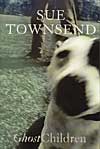 Sue Townsend
Sue Townsend
Soho Press ($22)
by Kris Lawson
Sue Townsend is best known for her series of Adrian Mole diaries, written from the point of view of a thirteen-year-old snob coping with adolescent angst, and her novel The Queen and I, a satiric fantasy in which the Royal Family is forced to abdicate and move to an urban housing estate. Although this new novel contains touches of Townsend's trademark farce, Ghost Children is a much more serious effort, offering a frightening glimpse at seemingly ordinary Britons whose inner lives are haunted and obsessive.
The title refers not only to the recurring images of fetuses and abused babies, but also to the lost children within each of the main characters. These characters are lonely, unemployed, riddled with addictions, and ultimately sterile. Townsend's writing in Ghost Children is stark. She defines her characters through their own thoughts and actions. Each chapter is
told from a single character's point of view, and Townsend explores her themes from these various angles; even the marginal characters—the parking lot attendant, the police constable, the doctor?are given space to ruminate over their encounters with the main characters.
The book's central relationship is between working-class Christopher and bourgeois Angela, who became estranged when Angela decided to abort their unborn daughter Catherine. Now a grossly overweight travel agent, Angela has since married Gregory, an obsessive-compulsive shop owner. Angela's outer life is controlled by Gregory and his rigid habits, and her inner life is empty, save for occasional appearances by Catherine and frequent stops for candy. Yet Angela's tryst with the Pick 'N' Mix candy shrine, as lovingly detailed by Townsend, seems healthy compared to the other relationships in the book.
Christopher, for instance, has all the traits of a serial killer. His electronics shop has gone under due to a badly timed nervous breakdown, and he lives an empty, aimless life until an encounter with a bag of fetuses galvanizes him into action. Christopher becomes obsessed with babies, especially Catherine, who he believes to be alive somewhere. Thus he decides to track down Angela, as only she can tell him where to find his missing child.
Once Christopher's quest begins, the novel's pace picks up speed. Townsend, closely treading the line between the fantastic and the truth-is-stranger-than-fiction, presents us with a dizzying sequence of events. In his search for Angela, Christopher encounters a devil-worshipping crackhead named Crackle, his "handmaiden" Tamara, and their baby daughter Storme. This strange little family may be fertile, but Crackle and Tamara are the worst parents a child could have.
There are obvious parallels between Crackle's control of Tamara, Gregory's control of Angela, and Christopher's pursuit of her. Poverty-level and middle-class lives are shown to be equally destructive. Most importantly, beneath the stark writing style lies the humor that Townsend manages to find in the bleakest situations. In her pointed observations of modern life, from ironic circumstance to the pathetically touching obsessions of her characters, Townsend finds the perfect edge.
Rain Taxi Print Edition, Vol.3 No. 2, Summer (#10) | © Rain Taxi, Inc. 1998
